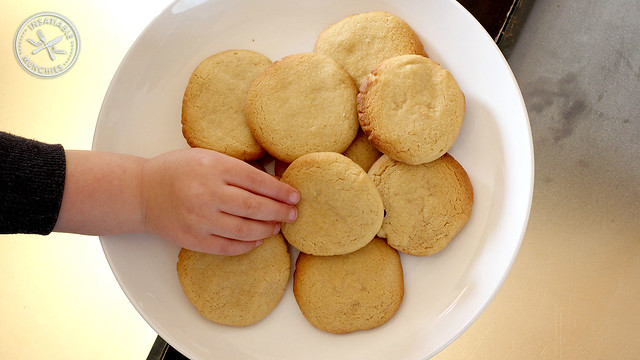Positive Parenting Tips to Keep Small Children from Sneaking Food
"No, James! I told you to ask first," repeats a frustrated mom for what seems like the hundredth time that day. If this sounds like your house, you may want to try some positive parenting techniques to keep your little one from sneaking food. Many parents have been down this road before with at least one child. As a veteran mom with kids of varying ages, I've had plenty of experience in this area. The first part of solving the issue lies in discovering the root of the sneakiness. Some kids may have an eating disorder, so it's also important to talk to the pediatrician first. These extra positive parenting tips that worked for us may help as well, if approved by the child's doctor.
Is your child getting enough food and nutrition? As children grow, they tend to eat more than they usually would, especially if they are going through a growth spurt. Some kids will even eat more than some adults. Look for signs that tell you to adjust your child's portion size at meals. If your child tries to go back for seconds and thirds or tries to have snacks immediately after dinner, you may not be providing enough to begin with. Also, pay attention to what food he sneaks and report this to the doctor, in case there is a nutritional deficiency. There may be certain vitamins and minerals lacking from the diet that your child is trying to compensate for. Are there enough snacks in between meals? If your child is trying to hoard or steal food, that may simply be a signal that he needs snacks. Keep a schedule of the times your child most often tries to steal food. If it occurs at similar times, schedule a snack at that time. If it's random, your child's feeding schedule may be inconsistent. Try to feed your child his meals and snacks at the same time every day so that his body can better form a hunger pattern. The actual time does not matter as much as it matters that the schedule stays the same. Watch for hunger cues. If you learn how your child behaves when hungry, you can intercept before he tries to sneak food. Being proactive like this is a more positive parenting method than being reactive. If you catch your child before he even thinks of doing the act, this can lessen instances without having to reprimand. If the sneaking has become a bad habit, this method may be tiring at first, but it will be worth it to see your child's sneaky food behaviors improve. Should you lock the cupboards and refrigerator? While this can be an easier temporary solution for frustrated parents, it can only make some children want the food more. It also can make a hoarding problem worse because they will want to hide food for later if they know they cannot access it easily. As small children get older, they will be more curious about how to remove the locking mechanisms. A more positive parenting method is to teach them to ask for the food, rather than take it. This way, when they are old enough to figure out locks, they are mature enough to understand why they shouldn't just steal food all the time. Never refuse food, unless it's absolutely necessary. Most children will know when they are full and will not be asking for food. Unless your child has obviously had enough, never say no when he asks for food. Also, if he sneaks food, ask something like "Why didn't you just ask for that?" If you do this consistently, your child will eventually learn that sneaking food is not necessary. This more positive way of teaching the lesson helps avoid making your child feel bad about food. Never, ever make a child feel bad about food. Also, do not use food as a reward. There needs to be a fair balance for your child to have healthy food behaviors. Using positive parenting methods to revert your child's food focus can be extremely helpful. But just like any other method, consistency is key. Be proactive, not reactive. In time, you will likely see a big improvement in your child's behavior and thoughts toward food. Note: The author's positive parenting method has evolved into what she calls Upstream Parenting. *I originally published this via Yahoo Contributor Network
1 Comment
Building a Toddler's Self-Confidence Without Over-Inflating It Toddlers don't have a care in the world, or at least it may seem that way to those of us who have bills and other big responsibilities. But just because your toddler does not have the same stress as you does not mean he or she isn't capable of feeling a little down. Building a toddler's self-esteem is all about patience, understanding and praise. But how do you build self-confidence without making your toddler think he or she is the best creation in the universe? As a veteran mother and former nanny, I've been down this road plenty of times.
Independence is key. This is always my No. 1 method of building self-confidence in toddlers. If they know they can do things for themselves, it helps them feel accomplished. As parents, it can be tempting to do everything for our kids. But remember that each task you do that they are capable of is keeping them from learning and growing. If you want to help, show them how to do it, and then just step back and let them do it. Toddlers can't very well be confident in their abilities if they aren't allowed freedom to practice them. Redirect instead of scolding, when possible. If toddlers do something wrong, it should be made known. But there is no reason to scold or make them feel bad about it. Simply redirect them to a more appropriate activity. Make sure they know why they are being restricted from a certain action or activity, and praise them for transitioning nicely. Like other methods, this only works if you are consistent. Be sure to redirect your toddler each time he or she takes that specific action. Not being allowed to do it is punishment enough. Scolding can destroy their self-esteem and make them feel worthless. By redirecting, you are teaching the lesson but allowing your toddler to remain confident in his or her abilities. Notice the good things and make it obvious. Don't just point out the bad behavior. When your toddler is behaving, let him or her know you are impressed. Building a toddler's self-esteem is essential, but you don't want to overdo it. Be careful not to do this for every single good behavior because this can lead to over-inflation of the ego. But pointing out the good things is important. Do it randomly, and make it genuine. Track goals with a simple chart. When toddlers can visually see something they have achieved, it can be great for the ego. Make a chart of some of the things they are expected to do each day, such as brushing their teeth, reading a book, picking up their toys, making their bed, and more. Use stickers or magnets to mark what has been done each day. When toddlers look at what they have accomplished, their self-esteem will likely rise. Allow them to make choices. Toddlers need to know they are trusted. This is an essential part of building self-esteem. When you're small, it seems like everyone can do things better than you can. Let your toddler make choices on a regular basis. These can be both big and small choices, but be sure they are things your toddler can handle. For instance, let your toddler choose his or her outfit in the morning. When shopping, give your toddler choices, even if that means his or her entire wardrobe turns out purple, like my daughter's. Building a toddler's self-esteem is all about choice and independence. The advice in this article was written by an experienced parent, not a licensed mental health professional. Consult an appropriately licensed health professional if your child shows signs of depression or other health issues. Navigating the bustling environment of a fast food restaurant with children can be challenging, but with the right strategies, it's entirely possible to ensure they behave appropriately. If you've ever encountered a child treating the restaurant like a playground, you're not alone. As a parent to several well-mannered children, I've seen my share of unruly behavior, yet I’ve managed to keep such incidents at bay with my kids. Here’s how you can do the same, ensuring a peaceful meal for everyone.
Understand the Environment Isn’t a Playground During a visit to a local Chipotle, my children and I observed the disruptive behavior of two young diners who seemed oblivious to the chaos they caused. Their relentless running and the potential dangers it presented—a possible slip from a spilled drink, or worse, choking—highlighted a lack of initial guidance from their caregiver. It’s crucial from the get-go to establish that the dining area is for eating, not for play. Settling children at their table promptly can teach them to associate the space with sitting and eating rather than running and playing. Consistency is Key in Messaging It’s disheartening to see children receive mixed signals from their guardians. In the same Chipotle, it took a considerable amount of time before the children were instructed to sit down, and when they were, the guidance was neither gentle nor consistent. Such inconsistency can confuse children about expected behaviors and boundaries. Clearly lay out expectations right from the start; let your children know that while they can be relaxed, the restaurant is not a place for rough play. Model Appropriate Behavior Children learn by example, and they are always watching and mimicking adult behavior. If a parent is engaged in loud conversations, constantly on their phone, or pacing around, children will likely emulate these actions. To foster good public conduct in your kids, lead by example. Show them how to be respectful and attentive in social settings. This not only teaches them how to behave but also ensures they respect the shared space of others. Keep Basic Needs in Check Another pivotal aspect of managing child behavior is addressing their fundamental needs. At Chipotle, the restless children had not been provided with food or drinks, which were only given out of kindness by the staff. A lack of nourishment can lead to irritable or hyperactive behavior. Always ensure your children are fed and have something to keep them engaged, such as coloring books, crayons, or quiet toys. Meeting these basic needs can significantly enhance their demeanor and reduce the likelihood of disruptive behavior. Implementing these simple yet effective strategies can make your dining experience enjoyable not just for you and your children, but for everyone around you. Remember, a fast food restaurant is a community space, and fostering a considerate and respectful environment starts with you and your children. So next time you're dining out, use these tips to ensure a peaceful and enjoyable meal. LAST UPDATED 5/6/2024 *I originally published a version of this via Yahoo Contributor Network Disciplining Without Yelling: Important for All Children
Many parents resort to yelling or shouting when their children do not listen. However, this may be damaging to your child in many ways. It can even affect the way your child behaves in school and what he thinks of himself. As a mother to many (with experience in nannying and babysitting), I have researched this topic extensively over the years.
Are You Healing or Hurting Your Child? Parental actions can either be the cause of a child's negative reactions or the cause of their healing process. It is up to the parent to decide which is better for their child. Obviously, most would choose the latter. What Are Some of The Negative Effects of Yelling? Multiple studies have shown that yelling can cause many negative effects for children. Some of those effects are feelings of fear, feeling insecure, feeling unworthy, low self-esteem, misbehavior in school or other public places, disruptive behavior, immunity to any type of discipline that involves yelling or speaking loudly, and many more. Is Your Child Worth The Struggle Not to Yell? Children are a difficult crowd to please at times, especially those with behavioral issues or those used to getting their own way. But, it can be much easier if you are willing to go through a small period of struggle first. What have you got to lose? You are likely already struggling, so a short-lived struggle is much better than an everyday one. First Steps in Ending Yelling As a Form of Discipline The first thing you need to do is make the conscious decision that you will no longer yell or shout at your child. There is a difference between speaking with a firm tone and yelling or shouting. When you speak with a firm tone, you are simply flattening your voice and you have a serious look on your face. You will be just a touch louder than normal, but you will not be close to yelling. If you are downstairs and someone upstairs can hear you, you are too loud and you are yelling. Organizing Your "No-Yelling" Plan Once you have made the decision not to yell anymore, you need a plan. Write down all the possible misbehaviors that you think your child might partake in. It doesn't have to be too specific. For example, taking a Barbie from a sibling and taking a book from a sibling is essentially the same thing, so that category could be "Using Other People's Property Without Permission". Organize the list and be sure that you don't have items that could be contained into the same category. After you have that list, rewrite it neatly on a separate piece of paper, leaving a few lines blank after each category. In those blank lines, write down what type of discipline could be used for each item. Some types of discipline will be repeated. Putting The No-Yelling Discipline Plan Into Action Think of a creative way to organize your list and frame it. Place it in an area that will be easy to access for the whole family. Whenever a child misbehaves, take him or her to the list and show him or her what the appropriate punishment is. Follow through every time. This means every time your child repeats an action that is not acceptable, take that child to chart and each time follow through with the corresponding punishment. The adjustment may be hard at first, but over time, it will get easier for you as well as for your child. Note: The author's positive parenting method has evolved into what she calls Upstream Parenting. *I originally published a version of this via Yahoo Contributor Network Does your teen need a boost of self-worth? Even if you answered no, it's always good to immerse teens in activities that help raise their self-confidence levels. The teenage years can be difficult to get through. But a healthy dose of self-esteem can play a vital role in helping them get through all the ups and downs of hormones and life itself. Self esteem isn't always something that comes naturally for everyone and even when it does, it's still great to nurture it. By consistently taking advantage of naturally occurring events and activities, your teens' self-esteem can shine.
Teach your teen a new dance or let them show you. Learning and conquering a new skill is a great confidence booster. You may think your teen is embarrassed to dance with you. But the truth is, most teens look up to their parents and want to please them. Showing you the dance techniques can be mastered is a simple and fun way for your teen to feel accomplished. Practice this often for optimal results. Dancing isn't really my thing. But one of my teens loves it. So I frequently watch her perform all the great new moves she learns and invents. Since I am not much of a dancer, I don't usually dance along. But she knows myself and the entire family love watching her perform. Let your teen help with a meaningful task. Trusting your teen with something that you normally do can be good for enhancing self worth. It's a great feeling knowing someone trusts you with an important task. Think about how you would feel if your boss put you in charge of something normally done by a person in a higher position than you. That's exactly how your teen will feel. It might be a little overwhelming at first. But imagine how great your teen will feel when the task is accomplished. Give your teen more responsibility and make trust obvious. Teens need preparation for when they become adults. This is the perfect age to give them more responsibility. Teach them about employment and how to apply for jobs. Summer and after-school positions are great for this stage. Even if your family does not need the extra money, this can be an important life lesson. Other responsibilities may include work around the house, grocery shopping, helping figure out the family budget, and other household responsibilities. Self worth often comes from successfully performing both simple and complex tasks. Compliment your teen when it's warranted. If you notice that your teen has a cute outfit on or a nice hairstyle, don't be afraid to say so. You may think it sounds cheesy. But truthful compliments can help your teen feel good about self image. Pay attention to not only your teen's appearance but also any completed tasks. Whenever any of my kids does something nice without me asking, I make sure I thank them and let them know how much it means to me. Be sure not to to overdo it or your compliments won't be taken seriously. Always be genuine and honest with your words. Let your teen work or volunteer. Serving others is an excellent way to help your teen feel good inside. There is no other feeling like the one found inside when giving to others. Aside from that, each goal or task your teen completes will help give a sense of accomplishment. My teen daughter is looking forward to the day when she can become an official volunteer at a local shelter. Until then, we spend a great deal of our own time visiting the animals and giving them affection. The kids feel so great knowing they have touched the lives of so many animals. *I originally published this via Yahoo Contributor Network |
Instant Download On Order
Categories
All
Archives
May 2024
|
- Brand Shamans
- Brand Healing
- Inner Healing
-
INTENT-SIVE NATURE
- Content & Brand Elevation
- Healing Jewelry & Talismans
- Bath, Beauty, & Self-Care
- Healing Sessions
- Rituals, Herbs, & Altar Supplies
- Gawwwdess Baby Boutique
- Soul Flame Gifts
- Yoga & Meditation
- Books & Media
- Education & Homeschool Resources
- Home, RV, & Decor
- Clothing
- Pets
- Custom Orders
- Monthly Subscription Boxes
- October Festivals
- FLOW-Key Parenting
- About & Contact
- RV, Nature, & Travel Shamans
- Souls Within
- Life & Home
- Heart 'N Mind Homeschool
- The Homeschooling Mommy
- Books & Authors
- Speak Up!
- Pawsitive Pet Parenting
- Manifesterz
- Gifts In Minutes
- Brand Shamans
- Brand Healing
- Inner Healing
-
INTENT-SIVE NATURE
- Content & Brand Elevation
- Healing Jewelry & Talismans
- Bath, Beauty, & Self-Care
- Healing Sessions
- Rituals, Herbs, & Altar Supplies
- Gawwwdess Baby Boutique
- Soul Flame Gifts
- Yoga & Meditation
- Books & Media
- Education & Homeschool Resources
- Home, RV, & Decor
- Clothing
- Pets
- Custom Orders
- Monthly Subscription Boxes
- October Festivals
- FLOW-Key Parenting
- About & Contact
- RV, Nature, & Travel Shamans
- Souls Within
- Life & Home
- Heart 'N Mind Homeschool
- The Homeschooling Mommy
- Books & Authors
- Speak Up!
- Pawsitive Pet Parenting
- Manifesterz
- Gifts In Minutes






 RSS Feed
RSS Feed





